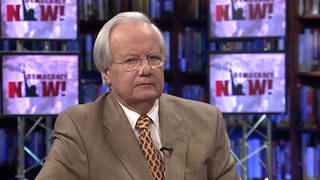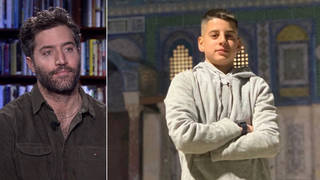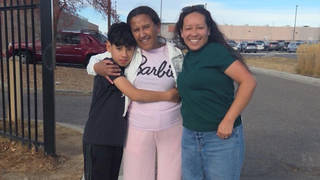
Israel’s security cabinet is considering plans to expand Israel’s assault on Gaza toward a full military takeover, with Prime Minister Benjamin Netanyahu reportedly pushing for a monthslong offensive on Gaza City and central Gaza refugee camps. The cabinet meeting comes as Israel’s forced starvation of Gaza claimed at least four new victims over the past 24 hours, according to health officials. “Israeli politicians have really made it no secret that they envision and want to see the mass displacement of Palestinians as southward as possible, if not completely ejected from the Gaza Strip,” says Amjad Iraqi, senior Israel-Palestine analyst at the International Crisis Group. Given that Israel’s allies have allowed the state to act with impunity, Iraqi adds, “you also cannot separate Gaza and the West Bank.” The Israeli government is “deciding that it could actually pursue and replicate many of the same policies in the West Bank.”
Transcript
AMY GOODMAN: This is Democracy Now!, democracynow.org. I’m Amy Goodman, with Nermeen Shaikh.
NERMEEN SHAIKH: Israel’s security cabinet is meeting this evening to discuss plans to expand Israel’s assault on Gaza toward a full military takeover, with Prime Minister Benjamin Netanyahu reportedly pushing for a monthslong offensive on Gaza City and central Gaza refugee camps.
The cabinet meeting comes as Israel’s siege of Gaza has led to the starvation deaths of four more Palestinians over the last 24 hours, according to health officials. Among them was a 2-year-old girl who died of malnutrition in the al-Mawasi area, which Israel had declared a safe zone despite repeatedly attacking Palestinians there.
Over the past day, unrelenting attacks by Israeli forces reportedly killed at least 98 Palestinians across Gaza, including 51 aid seekers. Among the dead is 41-year-old Suleiman Al-Obaid, a legendary former member of the Palestinian national soccer team who’s been described as the “Pelé of Palestine.” He was killed Wednesday while waiting for food near an aid site run by the militarized U.S.- and Israel-backed so-called Gaza Humanitarian Foundation, or GHF.
A new report by Médecins Sans Frontières, or Doctors Without Borders, describes GHF-run food distribution centers in Gaza as sites of, quote, “orchestrated killing and dehumanisation” that must be shut down. MSF’s director, Raquel Ayora, writes, quote, “Children shot in the chest while reaching for food. People crushed or suffocated in stampedes. Entire crowds gunned down at distribution points. In MSF’s nearly 54 years of operations, rarely have we seen such levels of systematic violence against unarmed civilians.”
Separately, Jordan has accused Israeli authorities of failing to intervene as Israeli settlers attacked a Gaza-bound envoy — Gaza-bound aid convoy on Wednesday. It was the second such incident in recent days. During one of the attacks, settlers were filmed chanting, “May Palestine’s name be wiped out.”
AMY GOODMAN: For more, we go to Haifa, Israel, to speak with Amjad Iraqi, senior Israel-Palestine analyst at the International Crisis Group. His recent piece for the London Review of Books is headlined “Walking Corpses.”
Amjad, thanks so much for being with us. If you can start off by talking about what is Netanyahu trying to accomplish right now by talking about a full military takeover of the Gaza Strip? You have families of hostages in more than 10 boats, in a flotilla that’s going — trying to challenge the siege on Gaza, to free the hostages there, and talking — and condemning Netanyahu’s war, not to mention the global pushback, with one country after another saying they’re going to recognize Palestine as a state. Your response?
AMJAD IRAQI: Thanks so much, Amy.
I mean, what you’re seeing right now is, essentially, what the Israeli government is putting on offer is a new iteration of a failed and destructive policy. So, back in May, the army officially launched what we know as — is called Operation Gideon’s Chariots. And this itself came a few months after Israel decisively shattered the ceasefire that it had with Hamas in the months before. And the kind of portrayal of this operation was that through a more aggressive approach by the Israeli military, that they would be able to, A, free the hostages and, B, destroy Hamas, in whatever terms that they described.
Now, we’ve come about three, four months on, and what we’ve actually seen is that this operation has failed even on its own terms. The army has not actually read the hostages of its own accord, aside from a handful, most of them in body bags, and Hamas is still fighting on the ground. It is still negotiating a ceasefire. It has not really been destroyed, even as it’s been taking severe hits. So, even on the Israeli terms, this operation has not succeeded.
But rather than sort of rethinking this approach, the Israeli government actually seems to think that the problem is that they haven’t been aggressive enough. This is even after you’ve essentially seen the complete rendering of Gaza as unlivable and ungovernable. And now you’re seeing this mass starvation spreading, to the point that 2 million people are now very slowly sinking into famine. And there is no real reflection by the part of the Israeli government that this war is actually reaching its course. And right now the politicians, especially by Prime Minister Netanyahu, are insisting that doubling down and going more aggressively, and especially by targeting Gaza City, which is one of the prime areas that the military wants to officially sort of set troops on the ground to try to eradicate Hamas infrastructure and to move hundreds of thousands of Palestinians from that city, this is potentially the next phase, if it does get ultimately approved by the cabinet. And this is a very alarming trend for affairs.
NERMEEN SHAIKH: Well, Amjad, you say in your London Review of Books piece, “Walking Corpses,” that far-right politicians — you’ve just mentioned this — Netanyahu included, hope quite openly that the policy of starvation that’s ongoing in Gaza now will encourage, quote, “'voluntary emigration' of Palestinians from the territory.” Now, where does the Netanyahu government imagine the Palestinians would go?
AMJAD IRAQI: As you said, the Israeli politicians have really made it no secret that they envision and want to see the mass displacement of Palestinians as southward as possible, if not completely ejected from the Gaza Strip. Now, in its most sort of conservative estimations or desires, according to this operation, it is to try to empty out those hundreds of thousands in Gaza City and to focus some in the southern half of the Gaza Strip, around areas like Deir al-Balah, including al-Mawasi. These are coastal areas. And keep in mind that over the course of the war, and especially over the past few months, most of Gaza’s 2 million people have been crunched into those particular enclaves. So, almost 80% of the strip is technically under Israeli military control. And so, the idea that they want to try now emptying Gaza City entirely, essentially making almost the entire northern half of the strip as empty of Palestinians as possible, whether it’s for military purposes, whether it’s for more far-right officials demanding the resettlement of Gaza, this is essentially the next phase, where that might end up being achieved.
And this will not be a straightforward approach, because we’ve actually been seeing that there are still Palestinian fighters on the ground, including in the north, who are giving the Israeli military a hard time on the ground. There are, of course, the masses themselves, who understand that even if they do go to the south, there is no guarantee that they can get more access to aid, even as the Israeli government insists that they will expand some of the aid distribution centers, which themselves have become, really, killing fields for people trying to grasp even a bit of food. And so, Gazans are really caught in the face of even more and more dangerous policies by the Israeli military. And like I said, they’ve really made it no secret that it’s not just about some military objectives, but that there are larger political, strategic goals that they’re trying to achieve by recarving Gaza’s geography and its demography.
AMY GOODMAN: I wanted to also ask you about the West Bank. We’re trying to follow news as it happens. You know, the Israeli military has returned the body of Odeh Hadalin. But as for what’s happening at the funeral now, Israeli forces barring mourners from attending his funeral, the Palestinian activist involved with the Oscar-winning film No Other Land, and talking about just the expansion of the Israeli settlements. Hagit Ofran, a member of the Israeli group Shalom Achshav, Peace Now, told Al Jazeera, “What we’re seeing since 1967, and especially in recent years, is that Israel is continuing to build and build settlements in the West Bank in order to annex the West Bank into Israel. In fact, the West Bank is already de facto annexed.” Talk about what’s happening there, as well, and how it relates to Israel saying they’re going to take over Gaza.
AMJAD IRAQI: So, it’s important to keep in mind that the West Bank is really the prime target for these Israeli right — far-right politicians. They do want to annex the territory, whether in law or in practice. They do want to also empty large parts of the territories of Palestinians. And this is exactly what’s actually been happening for decades, but it’s certainly in expedited form since October 7th. This goes from the government to the army to the settler enterprise on the ground, where they’ve really taken the Gaza war as an opportunity to go as far as they can to displace more Palestinians, seize more territory and advance more legislation to formally make large parts of the West Bank under Israeli control.
And you’ve seen the devastating results of this. Military operations in places like Jenin and Nablus and Tulkarm in the northern West Bank have completely destroyed and recarved refugee camps and major cities over there. You’re seeing settlers themselves also take — hand in hand with soldiers, institute checkpoints all across the West Bank, to the point that the West Bank economy is being completely stifled, that there’s no safety for Palestinians on the ground. There’s almost no functioning economy to speak of. And the sense more and more that they’re tightening the chokehold around Palestinians is really affecting people on the ground.
And here, it’s really important to note that you also cannot separate Gaza and the West Bank, not only for the fact that they are both occupied territories and with Palestinian populations, but that the Israeli military, the Israeli government is observing what it is advancing in Gaza, finding very little pushback, and deciding that it could actually pursue and replicate many of the same policies in the West Bank, starting with the north and potentially moving downwards. And so, for the Israeli far right, they really feel emboldened that this is a really historic opportunity to clinch as much of that territory as possible, even as they advance their own ambitions in Gaza.
NERMEEN SHAIKH: Well, what do you think? I mean, all this is going on as a group of 600 retired Israeli security officials have written an open letter to President Trump to urge Netanyahu — to urge him to pressure Israel to end the war. And signatories include three former heads of Mossad. There have also been some demonstrations in Israel against the war. And in May, Israel’s Channel 12 found in a poll that most Israelis think Netanyahu cares more about staying in power than winning the war. I mean, all of these things together, you’d think, may have some impact on what he’s planning to do, or indeed what he is doing, in Gaza and the West Bank. What do you think the effect of this is? Is there any pressure at all on his administration?
AMJAD IRAQI: There’s certainly been quite a groundswell of Israeli opposition, in very Israeli terms. I mean, those who question the war don’t necessarily question the kind of justification for it, but what they do feel are the economic consequences of it. What they do feel are soldiers who are either being killed, many being wounded, many coming back with PTSD and other effects of the war of these past two years. This is really the longest war that Israel has experienced. And you are seeing both current and former military officials say that there is nowhere further to go, and in particular the fact that the hostages have only been released through ceasefire negotiations and that they have not been freed by the army, and the fear of what might happen still to those who are still alive, and, of course, the bodies of those still captured by Hamas, that they feel that there is really not just a breaking of a promise to the hostages and their families, but to the social contract of Israelis, that they are not being prioritized, and that it is instead — that the government is instead really pursuing this maximalist ambition in Gaza, that it’s more interested, as you said, that — to those who see the prime minister really just trying to look out for his own political survival, but also his allies trying to also maximize those ambitions in the Occupied Territories.
So, there is this dissent in a certain way, but it has absolutely nothing to do with Palestinian humanity. It has very little to do with even the fact that Gaza is really in the throes of widespread starvation. In fact, in many ways, Israelis are almost indifferent. There are those who are also quite — are even cheering on this policy. They think that there’s nothing going on there. But it is about what this is actually doing to Israeli society, Israeli politics and the Israeli economy.
Now, what you might end up having is that you’ll end up having two thoughts at the same time, where you are seeing more Israelis say that they’re willing to end the war and achieve a ceasefire, but they wouldn’t mind if Israel goes back into Gaza, as long as they free the hostages, and, essentially, as long as they don’t have to pay a heavy price for what would essentially be a restructured occupation of Gaza. This is a dissonance that the international community is insisting needs to be pushed back on, but, unfortunately, this has not really deterred the Israeli government, and especially Prime Minister Netanyahu, from heeding these call, from seeing this opposition, precisely because there is still interest in continuing the war.
AMY GOODMAN: Very quickly, the role of the U.S.? I mean, you just had Speaker Johnson go to an Israeli settlement, Ariel, in the West Bank, bringing a Republican delegation. You have Trump tariffing countries all over the world — if that’s a word — for also political reasons, but not Israel, not to mention continuing to arm Israel.
AMJAD IRAQI: Indeed, the United States is still the prime mediator between Israel and Hamas in the ceasefire negotiations, and Trump and Witkoff and several other officials have insisted that they do want to see an end to the war and that this might be getting out of hand. Even Trump is signaling that he’s seen the images of the starving population in Gaza. Yet, in practice, the United States is almost always defaulting to Israel’s side in the negotiations and Israel’s side to the war. And it is actually trying to bide time constantly for the Israelis to almost achieve their objectives on their own accord, even as they’re seeing that this is not happening. And so, rather than being able to actually use its leverage to insist to Netanyahu and the government that enough is enough, they’re really not exercising this.
Now, this does not mean that everything is only in the hands of the U.S. It’s certainly the prime mover, but there are still other blocs of countries — the European Union, which is Israel’s biggest trading partner, which is now pushing towards recognition, but it’s still not activating its full leverage to make the conditions harder for Israel to continue the war. And the same with Arab states and normalization agreements and the refusal to even suspend part of those to show Israel that things have really gone too far, whether it’s in Gaza, to Lebanon, Syria and Iran. And so, there are still things that other countries can do to influence Israeli thinking and calculations, as well as the United States, even if Washington will try to push back on it. But there needs to be a recognition that without that collective pushback, that the Israelis and the Americans are going to continue determining and dictating the facts on the ground, and Gaza, first and foremost, is going to be thrown into further famine, and the West Bank may be fully and irrevocably annexed in the coming months or years.
AMY GOODMAN: Amjad Iraqi, we want to thank you for being with us, senior Israel-Palestine analyst at the International Crisis Group. We’ll link to your piece in the London Review of Books, “Walking Corpses.”
Up next, negotiations are underway in Geneva on a legally binding Global Plastics Treaty. We’ll speak with the co-author of the new medical journal Lancet’s report, “Plastics are a grave, growing, and under-recognised danger to human and planetary health.” Back in 15 seconds.
[break]
AMY GOODMAN: “Dear Someone” by Lila Downs in our Democracy Now! studio.













Media Options